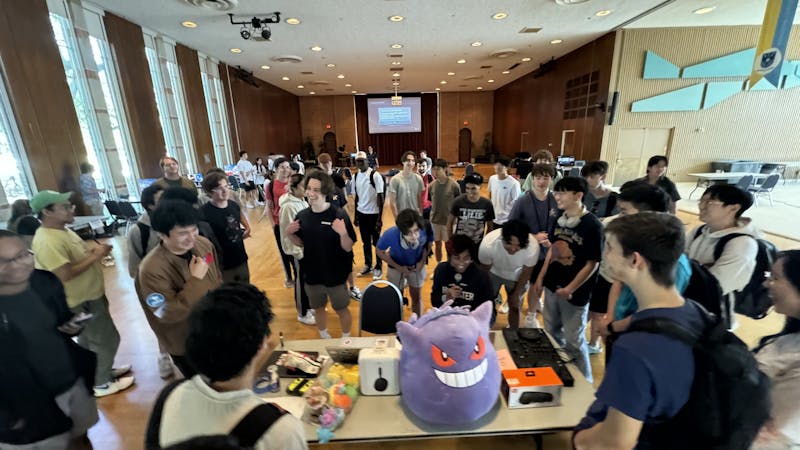Mental melodies: The science behind study music
As much as we hate to acknowledge it, exam time is upon us. Soon every nook and cranny of Fondren will be full of students glued to their textbooks and laptops, maintaining a level of focus that is only possible when 30 percent of your final grade is on the line.
While we all have different study habits, listening to music while studying is nearly ubiquitous among students. Who doesn’t like to put on their headphones and separate themselves from the outside world? Listening to your favorite songs lets you block out distractions while partially alleviating the monotony of endless problem sets and flashcards.
Chances are you’ve discovered that music is not always conducive to studying. For example, lately I’ve been shamelessly blasting Adele’s new album, but if I tried to listen to it while trying to understand my organic chemistry textbook, her booming, heartfelt vocals would quickly drown out my reading on oxidation of alkenes with peroxycarboxilic acids. When trying to decide what music should you listen to this exam season, the answer depends a lot on who you are and what you’re trying to do.
Let’s go back to trying to understand organic chemistry. The hardest part of sitting down to read a textbook is maintaining a sustained level of concentration. Reading and understanding a textbook passage involves a process called segmentation. Our brains segment information into logical chunks and boundaries. This is why your FWIS professor kept telling you to outline your papers. An organized paper “chunks” the information, making it easier to read and understand. A recent study from the Stanford University School of Medicine shows that when listening to symphonies, brain activity peaks during movement transitions. The ending of a movement cues your brain to start packaging the information it just listened to, keeping you alert.
However, listening to a symphony might not work for everyone, particularly if you’ve spent a lot of time at Shepherd. Research shows that people who are classically trained in music tend to be distracted by symphonies. This also applies to any genre and instrument. If you spend a lot of time playing guitar, it might not be a good idea to listen to Jimi Hendrix when you’re trying to write a paper. If you’re a singer, listening to songs you tend to belt in the shower probably won’t help you concentrate either.
I come from a family of violin players, so studying while listening to classical music tends to leave me staring at the same sentence in my textbook thinking about what life would be like if I were a Musi. So I dove a little deeper to see what are the best options for those of us who don’t jam to classical music.
One universal aspect of listening to music that enhances cognitive functioning is positivity. Listening to happy music increases dopamine levels in the brain, which helps you focus. This means listening to a symphony in a major key might enhance your mood and help you study better than one in a minor key. Electronic artists like Teebs and Baths produce more upbeat and playful music that helps me get through some of my most dense reading. Two of my favorite albums to study to are Teebs’ “Ardour” and Baths’ “Cerulean.”
The second component is lyrics. You probably already guessed that reading and listening to words at the same time doesn’t enhance productivity. Many people find that they can study to music with lyrics, as long as they are either incomprehensible or easy to tune out. For example, I find it pretty easy to tune out Morrissey when I’m listening to “The Smiths” since I can’t understand what he’s wailing about half the time anyway. I also often listen to Stereolab, an alternative band from London that has a French lead vocalist.
The third aspect is familiarity — you’re best off with music that you know by heart. We are creatures of habit, and if you’ve found a playlist or an artist that works for you, chances are you’re best off sticking to what you know. Keeping a playlist that you only listen to while studying cues your brain to focus when listening to those songs.
If you’re looking for more recommendations, I enjoy listening to electronic artists like SBTRKT, Four Tet and Bonobo. This kind of music tends to be upbeat enough to keep me engaged, but hypnotic enough not to distract me from what I’m doing. If you’re looking to steer away from electronic, El Ten Eleven is a post-rock LA-based duo with repetitive and catchy hooks and no lyrics to distract you if you’re trying to read. Hip hop beats and soundtracks are also great to listen to if you are looking for music without lyrics. A good place to start is Madlib’s “Shades of Blue,” and the instrumentals to J-Dilla’s “Donuts.”
In the end, if you’ve got your headphones on in Fondren, nobody will be able to tell whether you’re listening to Vivaldi’s “Four Seasons” or Taylor Swift’s “1989.” Sometimes you just have to choose what will get you through that next chapter.
More from The Rice Thresher

Jones wins men’s and women’s Beer Bike races, GSA snags alumni
Jones College won both the women’s and men’s Beer Bike 2024 races, while the Graduate Student Association claimed the alumni team win. Hanszen College bike teams were the runner-up in the alumni and men’s races, while Brown College was the runner-up in the women’s race. Martel and McMurtry Colleges did not bike in the alumni race, according to the Rice Program Council’s final report, and the GSA was disqualified from the men’s race for accidentally sending out two bikers simultaneously.

Super Smash Bros. ultimate tournament sees smashing success
The Super Smash Bros. Club held their second annual ultimate tournament Friday, April 12. Club president Jashun Paluru said all Smash players were welcome, regardless of ability, experience or involvement in the club. The event was held in collaboration with Owls After Dark, a late-night activity series headed by the Rice Student Center, at the Rice Memorial Center’s Grand Hall.

‘Off the beaten track’: Commencement speakers through the years
A former American president, Neil deGrasse Tyson, Nobel laureates and the founder of Khan Academy. All may share similar traits or levels of fame, but there’s another, quieter, common ground: They’ve all spoken at Rice’s commencement.

Please note All comments are eligible for publication by The Rice Thresher.